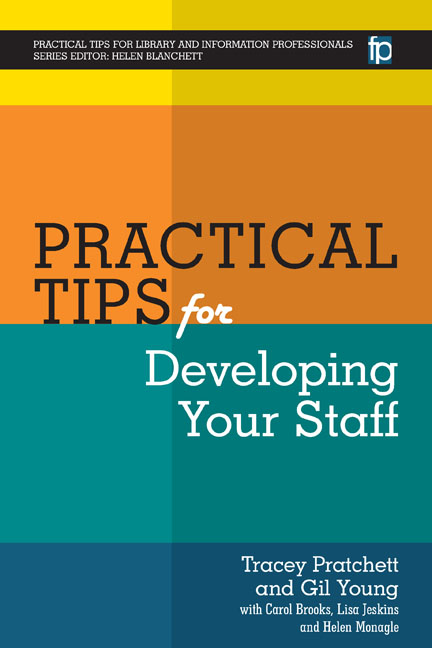Book contents
- Frontmatter
- Contents
- List of figures and tables
- Acknowledgements
- The authors
- List of abbreviations
- Series Editor's introduction
- Introduction
- Section 1 Theories
- Section 2 Infrastructure
- 11 Why develop staff?
- 12 Workforce planning
- 13 Job descriptions
- 14 Person specifications
- 15 Advertisements
- 16 Shortlisting
- 17 Interviews
- 18 Interviews – presentations and tests
- 19 Interviews – feedback
- 20 Inductions
- 21 Managing performance
- 22 Team development plans
- 23 Appraisals – preparing
- 24 Appraisals – conducting
- 25 Setting objectives
- 26 One-to-ones
- 27 Feedback – general
- 28 Team building
- 29 Team meetings
- 30 Sharing learning with the team
- 31 Writing references
- 32 Exit interviews
- 33 Effective handover
- Section 3 Activities and tools
- Index
26 - One-to-ones
from Section 2 - Infrastructure
Published online by Cambridge University Press: 09 June 2018
- Frontmatter
- Contents
- List of figures and tables
- Acknowledgements
- The authors
- List of abbreviations
- Series Editor's introduction
- Introduction
- Section 1 Theories
- Section 2 Infrastructure
- 11 Why develop staff?
- 12 Workforce planning
- 13 Job descriptions
- 14 Person specifications
- 15 Advertisements
- 16 Shortlisting
- 17 Interviews
- 18 Interviews – presentations and tests
- 19 Interviews – feedback
- 20 Inductions
- 21 Managing performance
- 22 Team development plans
- 23 Appraisals – preparing
- 24 Appraisals – conducting
- 25 Setting objectives
- 26 One-to-ones
- 27 Feedback – general
- 28 Team building
- 29 Team meetings
- 30 Sharing learning with the team
- 31 Writing references
- 32 Exit interviews
- 33 Effective handover
- Section 3 Activities and tools
- Index
Summary
REGULAR ONE-TO-ONE MEETINGS with your direct reports are essential to improving communication and establishing good relationships. Meetings can be monthly or weekly, dependent on time constraints or your LKS's needs. Meetings should remain confidential, be open, honest and provide an opportunity for two-way communication. Adair (2007) suggests that the one-to-one can help to create a supportive relationship, ensure clear direction and identify ongoing development needs. Meetings can be informal, used as a way to keep in touch with team members, or can be part of a formal performance management, appraisal or development process.
Well conducted meetings should be organized to give the individual time to discuss any problems, raise any issues and make suggestions for improving services. You should encourage the individual to use this time to ask you whether they can attend training courses or events which may help them to fulfil the requirements of their job. As a manager it is your role to listen, take suggestions on board, coach staff to find solutions, work with the individual to resolve any issues and essentially follow through on any actions.
Whilst the one-to-one meeting should provide a safe space for the individual to talk to you, it is also an opportunity for you to address any issues with performance, keep track of projects and objectives and find out what is really important to your team members. Ensure that you give constructive feedback. Crucially you should not dominate the meeting, but you must ensure that you have set time aside to address any issues that you want to discuss. The meeting should not be confrontational and you need to be aware of the power balance in play.
A well organized meeting will be rewarding, with each participant having a clear understanding of the purpose. An agenda set prior to the meeting ensures that the individual can prepare and it is important that you both review the notes of the previous meeting. A basic template can help to maintain focus for the meeting and could include the following points:
• meeting date
• areas for discussion – individual
• areas for discussion – manager
• follow-up actions.
- Type
- Chapter
- Information
- Practical Tips for Developing Your Staff , pp. 61 - 63Publisher: FacetPrint publication year: 2016



